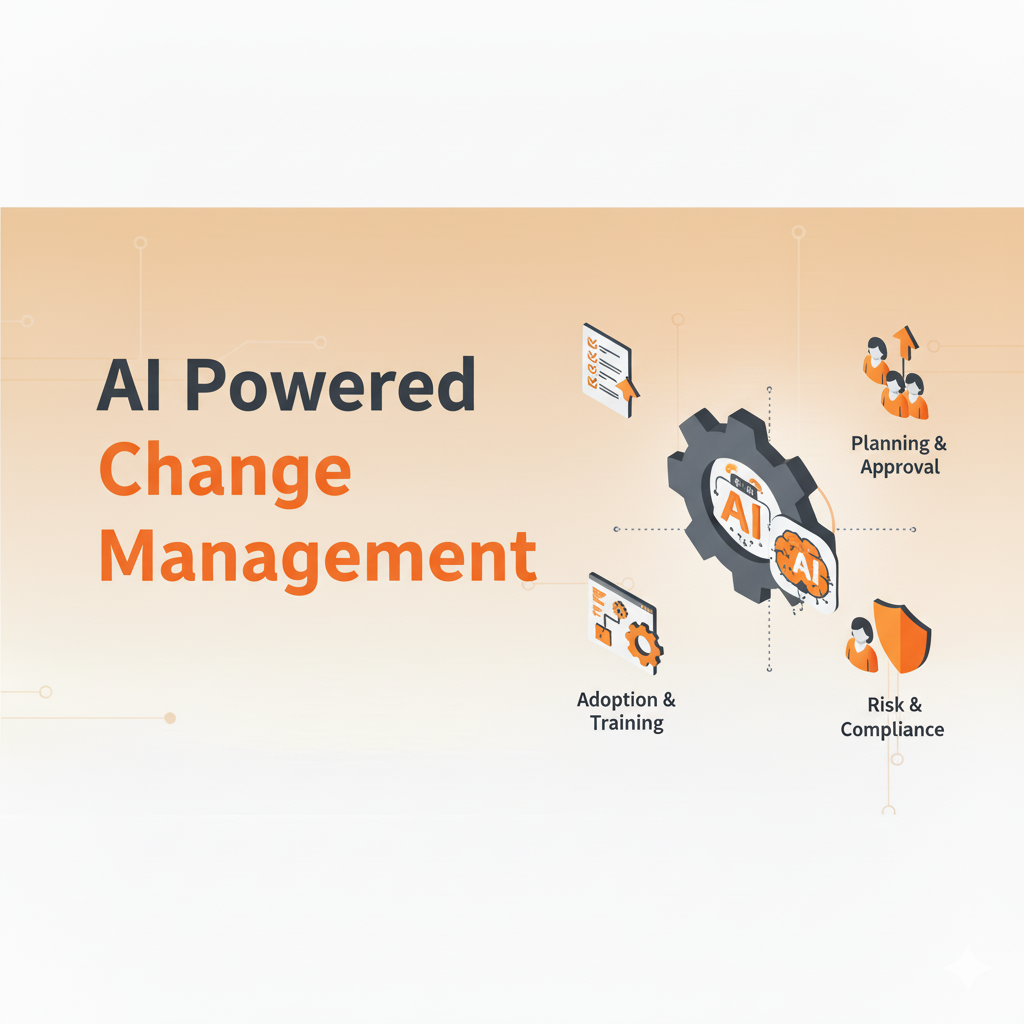Aprimorando a TI com o gerenciamento de serviços de IA em 2025
O gerenciamento de serviços de IA combina IA com serviço de TI gerenciamento para aumentar a eficiência, automatizar tarefas e melhorar a satisfação do usuário. Este artigo discute como a IA remodela o ITSM, seus benefícios e aplicativos do mundo real.
Principais conclusões
- A IA está revolucionando o gerenciamento de serviços de TI ao automatizar tarefas rotineiras e aprimorar as experiências do usuário por meio de tecnologias de IA genéticas e generativas.
- A hiperautomação aumenta a eficiência nas operações de TI para simplificar os fluxos de trabalho, melhorando o serviço entrega e capacitação proativa incidente gerenciamento usando análise preditiva.
- As ferramentas de IA aprimoram o gerenciamento do conhecimento atualizando automaticamente os recursos informacionais e fornecendo informações relevantes, resultando em maior qualidade de serviço e satisfação do cliente.
Entendendo a IA no gerenciamento de serviços
A IA está se tornando uma parte essencial do gerenciamento de serviços de TI, remodelando fundamentalmente o cenário de TI. Essa transformação não diz respeito apenas à tecnologia, mas à criação de fluxos de trabalho intuitivos que aumentam a eficiência e a satisfação do usuário. As práticas de gerenciamento de serviços estão sendo refinadas com ferramentas de IA que ajudam a simplificar os processos de serviço, automatizar tarefas rotineiras e fornecer insights em tempo real.
Existem dois tipos principais de IA que estão causando impactos significativos no suporte de TI: agente de IA e IA generativa. A Agentic AI se concentra na criação de sistemas responsivos que podem gerenciar e resolver solicitações de serviço de forma autônoma, enquanto a IA generativa aprimora a experiência do serviço para gerar respostas semelhantes a humanos e informações contextualmente relevantes. Esses avanços são apoiados por uma grande variedade de recursos, incluindo vídeos, blogs e podcasts, que ajudam as equipes de TI a lidar com as complexidades da integração da IA em suas práticas de gerenciamento de serviços.
A IA também desempenha um papel crucial no gerenciamento operacional, ajudando a administrar centros de operações conectados. Utilizar os recursos de IA para otimizar a qualidade do serviço e aprimorar o gerenciamento do conhecimento garante que a prestação de serviços não seja apenas eficiente, mas também melhore continuamente.
Principais benefícios do gerenciamento de serviços baseado em IA
A implementação do hyper-automação em serviço o gerenciamento permite que as organizações obtenham melhor escalabilidade e capacidade de resposta em suas operações de TI. Automatizar o tratamento de solicitações de serviço com IA reduz a carga de trabalho manual das equipes de TI e mantém altos níveis de serviço para os usuários. Isso não só aumenta a produtividade, mas também leva a um maior retorno sobre o investimento em iniciativas de TI.
As soluções baseadas em IA simplificam o gerenciamento de tíquetes por meio de categorização e sugestões inteligentes, minimizando a carga de trabalho manual dos agentes e permitindo que eles se concentrem em questões mais complexas. A integração da IA às centrais de atendimento aumenta a produtividade, permitindo o tratamento eficiente de problemas complexos sem diminuir a qualidade do serviço. A IA generativa desempenha um papel significativo aqui, reduzindo os custos operacionais e minimizando a dependência de agentes humanos.
Além disso, as opções de autoatendimento baseadas em IA atendem à crescente preferência por autoatendimento entre os usuários, reduzindo a necessidade de intervenção manual. A IA adapta as soluções analisando o comportamento do usuário, aumentando a satisfação e a prestação de serviços. Essa estratégia de mudança para a esquerda, juntamente com a automação inteligente, leva à deflexão de tíquetes e à redução no número de tíquetes já administrados, elevando assim a produtividade dos funcionários.
Como a IA aprimora os processos de ITSM
A IA aprimora os processos de ITSM automatizando o gerenciamento de incidentes, permitindo o diagnóstico e a resolução mais rápida de problemas de TI. O tratamento proativo de incidentes por meio da IA permite o reconhecimento de padrões em problemas recorrentes, levando notificações e soluções mais rápidas para as partes interessadas. Essa abordagem proativa é um divisor de águas para garantir a prestação ininterrupta de serviços e a alta qualidade do serviço.
As tecnologias de IA categorizam e encaminham automaticamente as solicitações de serviço, melhorando os tempos de resposta e a eficiência geral. As ferramentas de IA gerenciam todo o ciclo de vida do ticket, da criação à resolução, sem intervenção humana, garantindo a priorização e a resolução rápida de problemas críticos. Essa solicitação de serviço inteligente central de gerenciamento e atendimento a automação melhora significativamente o desempenho da central de serviços e a satisfação do usuário.
A análise preditiva, um recurso essencial do ITSM orientado por IA, ajuda a prever possíveis falhas do sistema antes que elas interrompam as operações. A IA prevê problemas futuros analisando dados de incidentes anteriores, permitindo ações preventivas. Esse nível de previsão é inestimável no gerenciamento de ativos, otimizando o rastreamento e prevendo as necessidades de manutenção de hardware, garantindo assim operações de TI perfeitas.
Recursos de aprendizado de máquina no gerenciamento de serviços de IA
O aprendizado de máquina potencializa recursos inteligentes detectando padrões, prevenindo problemas e fornecendo recomendações em tempo real que aprimoram a tomada de decisões no gerenciamento de serviços. Os algoritmos de aprendizado de máquina identificam padrões e analisam dados históricos para prever e evitar incidentes antes que eles ocorram, garantindo a prestação ininterrupta de serviços. Essa abordagem proativa é essencial para manter a alta qualidade do serviço e a eficiência operacional.
A hiperautomação utiliza a análise preditiva para identificar possíveis problemas antes que eles afetem as operações, permitindo que as equipes de TI tomem medidas preventivas. Essa integração dos recursos de aprendizado de máquina às práticas de gerenciamento de serviços de TI garante que a tomada de decisões seja orientada por dados e informada por insights em tempo real. A IA aprimora a identificação de tendências e a tomada de decisões estratégicas ao extrair informações valiosas de grandes conjuntos de dados.
O uso da IA no gerenciamento de problemas ajuda a descobrir as causas dos incidentes recorrentes ao analisar as tendências dos dados. Os algoritmos de aprendizado de máquina oferecem às equipes de TI uma compreensão mais profunda dos padrões de incidentes, permitindo soluções eficazes que evitam futuras ocorrências e melhoram a qualidade e a confiabilidade geral do serviço.
Assistentes virtuais e automação inteligente
Assistentes virtuais com inteligência artificial garantem disponibilidade 24 horas por dia, 7 dias por semana, atendendo às expectativas dos clientes de suporte imediato fora do horário comercial padrão. Esses assistentes virtuais interagem com os usuários em linguagem natural, fornecendo respostas instantâneas e precisas, o que aumenta a satisfação do cliente e permite que os agentes humanos se concentrem em tarefas mais complexas. Esse recurso é crucial no ambiente acelerado de hoje, em que o suporte imediato geralmente é uma necessidade.
Os agentes de IA automatizam o encaminhamento de tickets de suporte para as equipes apropriadas, reduzindo os tempos de espera e aumentando a satisfação do cliente. Os chatbots inteligentes aprimoram o gerenciamento de serviços fornecendo autoatendimento 24 horas por dia, respondendo perguntas, solucionando problemas e escalando problemas conforme necessário. A IA generativa auxilia ainda mais os agentes, desviando consultas e gerenciando solicitações rapidamente, garantindo que os processos de serviço sejam eficientes e fáceis de usar.
A automação inteligente combina inteligência artificial com automação robótica de processos, simplificando tarefas simples e complexas. Essa integração melhora a eficiência do atendimento ao cliente ao lidar com consultas de rotina e aprimorar os tempos de resposta. A hiperautomação leva isso a um passo adiante ao integrar a automação orientada por IA para otimizar as operações de TI, minimizar tarefas repetitivas e aprimorar a eficiência geral.
A IA generativa pode criar guias de solução de problemas e soluções proativas, ajudando as equipes de TI a gerenciar com eficiência os problemas exclusivos do usuário. A automação inteligente também aprende e se adapta, automatizando tarefas complexas além da simples criação de scripts. Essa capacidade dinâmica garante que as operações de TI estejam continuamente melhorando e se adaptando aos novos desafios.
IA generativa no gerenciamento de serviços
A IA generativa usa aprendizado profundo e redes neurais para produzir respostas semelhantes às humanas e informações contextualmente relevantes. Essa tecnologia avançada permite resumos em tempo real de dois incidentes, permitindo uma comunicação e tomada de decisões mais rápidas. Ao simplificar as operações e realizar análises de sentimentos, a IA generativa permite que as organizações respondam rapidamente às oportunidades e desafios.
A IA generativa pode ajudar na criação de conteúdo de comunicação mais eficaz, melhorando a clareza e a eficiência nas interações com os clientes. Ao utilizar grandes modelos de linguagem, ele melhora a precisão dos relatórios de registros de incidentes, garantindo que os problemas sejam documentados com precisão e resolvidos com eficiência. Esse recurso é essencial para manter a alta qualidade do serviço e garantir que as equipes de TI possam gerenciar as solicitações de serviço com eficiência.
A implementação da IA generativa no gerenciamento de serviços aprimora o gerenciamento do conhecimento ao automatizar a criação e a atualização de artigos da base de conhecimento. Isso garante que as equipes de suporte de TI tenham acesso às informações mais recentes, melhorando sua capacidade de resolver problemas com rapidez e precisão.
Hiperautomação nas operações de TI
A hiperautomação consiste em orquestrar processos de negócios inteiros em diferentes sistemas e equipes, automatizar fluxos de trabalho complexos e otimizar processos para obter eficiência e escalabilidade. A hiperautomação, impulsionada por tecnologias de IA, aprimora significativamente as operações de TI ao reduzir o tempo de inatividade do serviço e melhorar a eficiência geral.
A IA automatiza e simplifica a integração aprendendo formatos de dados e mapeando conexões. Esse recurso garante que vários sistemas de TI funcionem perfeitamente juntos, fornecendo um ambiente de gerenciamento de serviços coeso e eficiente.
A hiperautomação também melhora a produtividade dos funcionários ao minimizar tarefas repetitivas e permitir que as equipes de TI se concentrem em iniciativas mais estratégicas.
Aprimorando o gerenciamento do conhecimento com IA
A IA aprimora o gerenciamento aprimorado do conhecimento ao organizar bases de conhecimento e sugerir conteúdo para preencher lacunas de informações. As ferramentas orientadas por IA podem criar e atualizar automaticamente artigos da base de conhecimento analisando as interações e os dados do usuário, garantindo que as informações mais relevantes e atualizadas estejam sempre disponíveis. Esse recurso é crucial para manter um sistema de suporte de TI eficiente e eficaz.
O uso da IA generativa pode agilizar as atualizações de artigos de conhecimento, garantindo que as equipes de suporte de TI tenham acesso às informações mais recentes. A IA ajuda a automatizar a coleta e distribuição do conhecimento organizacional, melhorando a acessibilidade das equipes de serviço. Usando o processamento de linguagem natural, a IA categoriza e analisa grandes conjuntos de dados, tornando as informações pertinentes prontamente disponíveis.
A IA de gerenciamento de conhecimento pode oferecer proativamente soluções relevantes com base em dados históricos e contextos. Isso melhora os tempos de resposta no atendimento ao cliente ao fornecer rapidamente as informações necessárias aos agentes, garantindo um suporte consistente e de alta qualidade. Os sistemas de IA aprendem e se atualizam continuamente, fornecendo suporte consistente em todas as operações de TI e mantendo um repositório de conhecimento atualizado.
Aplicações reais de IA no ITSM
A integração da IA no gerenciamento de serviços de TI leva a resultados significativos, como economia de custos, maior tempo de atividade e gerenciamento proativo de TI. A IA otimiza os fluxos de trabalho e reduz os custos, garantindo operações de TI eficientes e eficazes que oferecem alta qualidade de serviço. Esses aplicativos do mundo real demonstram os benefícios tangíveis de aproveitar as tecnologias de IA no gerenciamento de serviços.
Exemplos de vários setores destacam como as práticas de gerenciamento de serviços baseadas em IA aumentam a satisfação do usuário e a eficiência operacional. Da automatização de tarefas rotineiras ao fornecimento de soluções inteligentes de automação, as ferramentas de IA estão se transformando da mesma forma que os departamentos de TI gerenciam solicitações de serviços e lidam com problemas complexos.
Ferramentas e plataformas de IA para ITSM
As plataformas Agentic AI aprimoram o gerenciamento de serviços de TI gerenciando de forma autônoma a prestação de serviços, otimizando as operações e melhorando as experiências do usuário. As ferramentas de IA no ITSM ajudam as organizações a otimizar processos, reduzir cargas de trabalho manuais e aprimorar a qualidade do serviço por meio da automação inteligente. Os principais produtos da Serviceaide, incluindo Luma AI e Mudar de equipamento O ITSM foi projetado para aumentar a produtividade e permitir o autoatendimento.
O Luma AI oferece funcionalidades como agente virtual e copiloto, com o objetivo de aprimorar a automação em todos os setores. Essas ferramentas fornecem informações valiosas e recomendações baseadas em dados, melhorando a tomada de decisões e garantindo que as equipes de TI possam gerenciar com eficiência as solicitações de serviço.
O aproveitamento dos recursos de IA permite que as organizações melhorem significativamente suas práticas de gerenciamento de serviços de TI e ofereçam uma qualidade de serviço excepcional.
Estratégias de adoção de IA para equipes de TI
A adoção da IA nas equipes de TI exige uma abordagem estratégica para garantir uma integração bem-sucedida e maximizar os benefícios das tecnologias de IA. Mudar o foco da solução de problemas para a inovação, automatizando os processos de rotina, permite que as equipes de TI se concentrem em iniciativas mais estratégicas. É necessário estabelecer diretrizes para o uso responsável da IA para evitar riscos potenciais, como vazamentos de dados.
O aprimoramento contínuo dos membros da equipe é essencial para aproveitar os recursos da IA com responsabilidade. Compreender os padrões de comportamento do usuário e usar a análise preditiva ajuda as equipes de TI a identificar tendências e aprimorar as práticas de gerenciamento de serviços. Essa abordagem garante que as ferramentas de IA sejam usadas de forma eficaz e que as equipes de TI estejam equipadas para lidar com as complexidades do gerenciamento de serviços com inteligência artificial.
Resumo
A integração da IA com a TI o gerenciamento de serviços está se transformando o cenário, oferecendo vários benefícios, como maior eficiência, escalabilidade e satisfação do usuário. Da automatização de tarefas rotineiras ao aprimoramento do gerenciamento do conhecimento e ao fornecimento de insights em tempo real, as tecnologias de IA estão revolucionando as práticas de gerenciamento de serviços.
À medida que avançamos, aproveitar os recursos de IA será crucial para que as organizações se mantenham competitivas e ofereçam uma qualidade de serviço excepcional. Ao adotar ferramentas e plataformas de IA, as equipes de TI podem simplificar os processos, reduzir as cargas de trabalho manual e se concentrar na inovação, garantindo que estejam bem equipadas para lidar com os desafios do futuro.
Latest Insight

Practical AI for NERC CIP Compliance

change manager










.svg)
.svg)